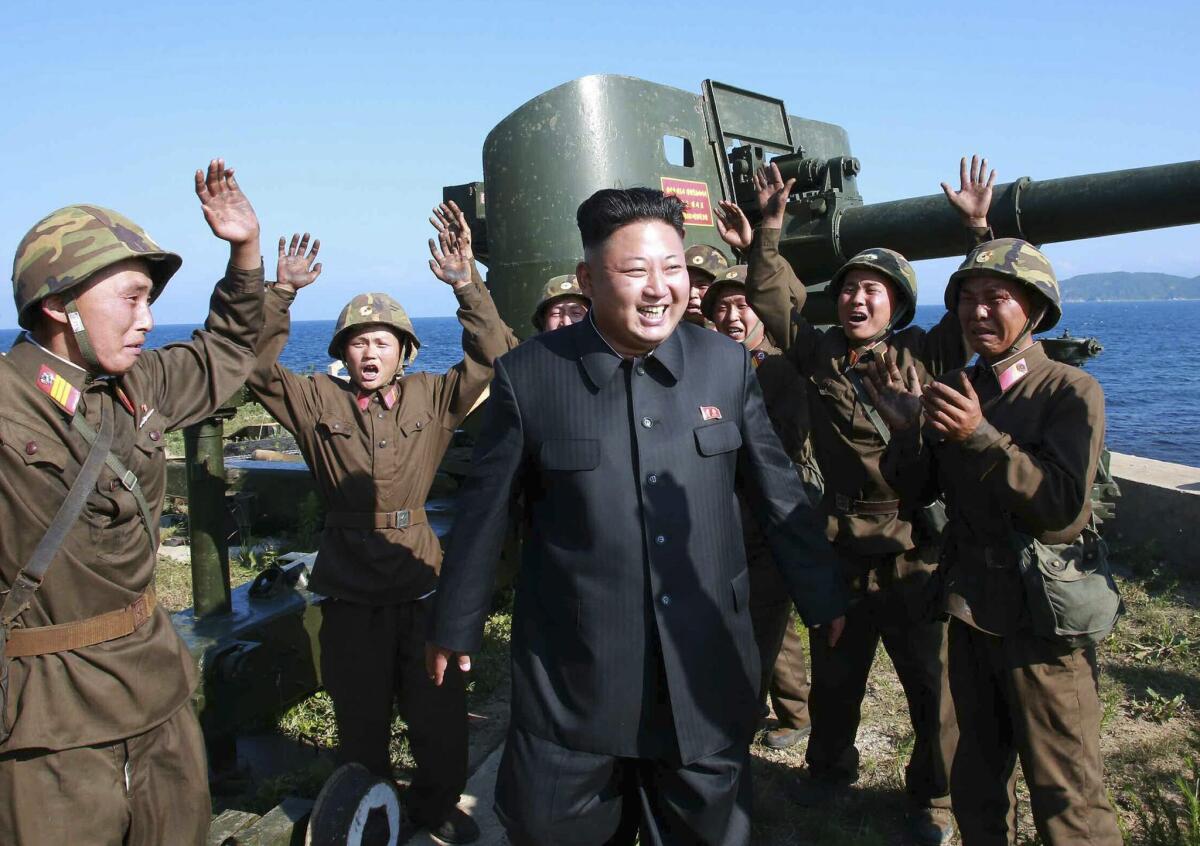North Korea decries U.S. allegations on Sony hack; U.S. turns to China

- Share via
Reporting from Beijing — Decrying U.S. allegations that it was behind a cyberattack on Sony Pictures as an “unfounded rumor,” North Korea on Saturday proposed a “joint investigation” into the hacking that prompted the studio to cancel the theatrical release of the comedy “The Interview,” which centers on a plot to assassinate North Korean leader Kim Jong Un.
“We have a way to prove that we have nothing to do with the case,” North Korea said in a statement carried by the official Korean Central News Agency, quoting an unnamed spokesman from the North Korean Foreign Ministry. Pyongyang warned that the “U.S. should bear in mind that it will face serious consequences in case it rejects our proposal for joint investigation and presses for what it called countermeasure[s].”
The FBI on Friday blamed North Korea for the cyberattack on the studio, which divulged executives’ salaries, sensitive emails, scripts and saw the release of full-length films including “Annie” and “Fury.” The reclusive Pyongyang government said American officials had leveled the accusations “without presenting any specific evidence.”
“Clear evidence is needed to charge a sovereign state with a crime,” the statement said.
U.S. officials did not back down Saturday.
“As the FBI made clear, we are confident the North Korean government is responsible for this destructive attack,” said National Security Council spokesman Mark Stroh in a statement. “ We stand by this conclusion. The government of North Korea has a long history of denying responsibility for destructive and provocative actions. If the North Korean government wants to help, they can admit their culpability and compensate Sony for the damages this attack caused.”
A senior Obama administration official said the U.S. had discussed the issue with Chinese officials “to share information, express our concerns about this attack and to ask for their cooperation.”
“In our cybersecurity discussions, both China and the United States have expressed the view that conducting destructive attacks in cyberspace is outside the norms of appropriate cyber behavior,” said the senior official, who was not authorized to speak publicly on the subject.
President Obama on Friday said the U.S. would respond to the cyberattack, though he declined to outline the options under consideration. “They caused a lot of damage. And we will respond,” he said. “We will respond proportionally, and we’ll respond in a place and time and manner that we choose.”
The FBI said technical analysis of the data-deletion malware in the Sony hack “links to other malware that the FBI knows North Korean actors previously deployed.” Agents found similarities in specific lines of code, encryption algorithms, data-deletion methods and compromised networks.
The bureau also said it found overlap in the system used in the Sony attack and “other malicious cyber activity the U.S. government has previously linked directly to North Korea.”
The tools used in the Sony assault had “similarities to a cyberattack in March 2013 against South Korean banks and news outlets, which was carried out by North Korea,” the FBI said.
North Korea said the charges by the United States revealed its “inveterate bitterness” toward the country, even as Pyongyang acknowledged that scenes in the film, starring Seth Rogen and James Franco, were “hurting the dignity of the supreme leadership.”
North Korea suggested it would retaliate against “undesirable elements keen on hurting the dignity of the supreme leadership” of the country.
“In case we retaliate against them, we will target with legitimacy those responsible for the anti-[North Korean] acts and their bases, not engaging in terrorist attack aimed at the innocent audience in cinemas,” the statement said. “The army … has the will and ability to do so.”
Obama on Friday chastised Sony for canceling the release of “The Interview,” which was scheduled to arrive in theaters on Christmas Day, after threats from anonymous hackers. Obama’s remarks were a strong defense of free expression and an unusual public rebuke by an American president of a corporate decision.
Sony Pictures “made a mistake,” the president said.
In response, Sony Pictures Entertainment’s chief executive, Michael Lynton, sought to deflect responsibility onto theater chains, saying Sony had “no alternative” but to cancel the release after exhibitors balked.
Times staff writer Michael A. Memoli in Washington contributed to this report.
Follow @JulieMakLAT for news from China
More to Read
Sign up for Essential California
The most important California stories and recommendations in your inbox every morning.
You may occasionally receive promotional content from the Los Angeles Times.











